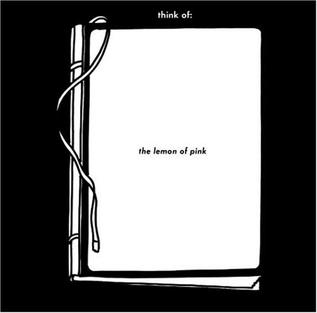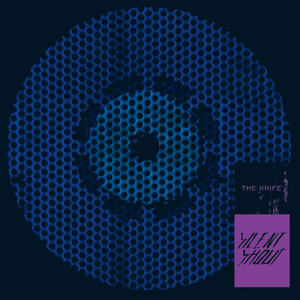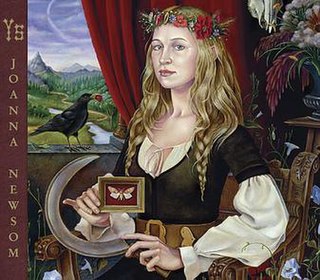
Boards of Canada are a Scottish electronic music duo consisting of the brothers Michael Sandison and Marcus Eoin, formed initially as a trio in 1986 before becoming a duo in the 1990s. Signing first to Skam followed by Warp Records in the 1990s, the duo received recognition following the release of their debut album Music Has the Right to Children on Warp in 1998. They followed with the critically acclaimed albums Geogaddi (2002), The Campfire Headphase (2005) and Tomorrow's Harvest (2013).

The Argument is the sixth and final studio album from the post-hardcore band Fugazi released on October 16, 2001, through Dischord Records. It was recorded at Don Zientara's Inner Ear Studios in Arlington, VA and the Dischord House between January and April 2001. It was the band's last release before going on hiatus in 2003, until the release of First Demo over thirteen years later.

Geogaddi is the second studio album by Scottish electronic music duo Boards of Canada, released on 18 February 2002 by Warp Records. It was recorded between 1999 and 2001 at Hexagon Sun, their Pentland Hills studio. The album was intended to be—and has been described as—darker in tone than their debut studio album Music Has the Right to Children, released in 1998.

Lift Your Skinny Fists like Antennas to Heaven is the second studio album by Canadian post-rock band Godspeed You! Black Emperor, released as a double album October 9, 2000 on vinyl by Constellation, and November 8, 2000 on CD by Kranky. It was listed on multiple decade-end lists as one of the greatest albums of the 2000s.

Madvillainy is the only studio album by American hip hop duo Madvillain, consisting of British-American rapper MF Doom and American record producer Madlib. It was released on March 23, 2004, on Stones Throw Records.
The Books were an American-Dutch duo, formed in New York City in 1999, consisting of guitarist and vocalist Nick Zammuto and cellist Paul de Jong. Their music typically incorporated samples of obscure sounds and speech. They released three critically acclaimed albums on the German label Tomlab, and released their fourth studio album, The Way Out, on Temporary Residence Limited in July 2010.

The Lemon of Pink is the second studio album by American musical duo the Books. It was released on October 7, 2003 by Tomlab. Like much of the duo's work, the songs on The Lemon of Pink juxtapose samples with folk and string instrumentation and other melodic elements, including guest vocals by Anne Doerner.

Lost and Safe is the third studio album by American musical duo the Books. It was released on April 5, 2005 by Tomlab. As with the duo's prior records, Lost and Safe features extensive sampling.

Take Me to Your Leader is the second studio album by British-American MC/producer MF Doom, released under the alias King Geedorah via Big Dada on June 17, 2003. King Geedorah is the alias MF Doom used as part of the underground super group Monsta Island Czars. The album features guest appearances from MF Grimm as well as other MIC members. The character is based on the three-headed King Ghidorah, a fictional monster who appears as Godzilla's enemy in the Godzilla films.

Vaudeville Villain is the third studio album by British-American rapper-producer MF Doom, released on September 16, 2003 under the pseudonym of Viktor Vaughn. All of the tracks are produced by Sound-Ink record label members Heat Sensor, King Honey, and Max Bill, with the exception of "Saliva", produced by RJD2.

Benjamin Thomas Jacobs, more commonly known by the stage name Max Tundra, is an English multi-instrumental musician, singer and music producer. His work is noted for its maximalist approach, which is predominantly electronic music but incorporates non-electronic styles and instruments. Jacobs' production style has been noted as an influence on the hyperpop style which became prevalent in the 2010s onwards.

Feels is the sixth studio album by American experimental pop band Animal Collective, released on October 18, 2005 by FatCat Records. The album received acclaim from music critics, and was included at number 55 on Pitchfork's list of "The 200 Best Albums of the 2000s". As of 2008, Feels sold 55,000 copies in the US.

Silent Shout is the third studio album by Swedish electronic music duo the Knife, released on 17 February 2006 by Rabid Records. The album is darker than its predecessor, Deep Cuts (2003). It spawned four singles: "Silent Shout", "Marble House", "We Share Our Mothers' Health" and "Like a Pen".

Ys is the second studio album by the American singer-songwriter Joanna Newsom, released by Drag City on November 14, 2006. It was produced by Newsom and Van Dyke Parks, recorded by Steve Albini and mixed by Jim O'Rourke, with orchestral arrangements by Van Dyke Parks. It features guest vocals from Bill Callahan and Emily Newsom. The vocals and harp were recorded at the Village Recording Studio in Los Angeles in December 2005, with the orchestration recorded between May and June 2006 at the Entourage Studios in Los Angeles.

The Disintegration Loops is a series of four albums by the American avant-garde composer William Basinski, released in 2002 and 2003. The albums comprise tape loop recordings played for extended time, with noise and cracks increasing as the tape deteriorated. Basinski discovered the effect while attempting to transfer his earlier recordings to digital format.

High Places is the debut full-length from Brooklyn indie band High Places. The album was released September 23, 2008, by Thrill Jockey.

The Way Out is the fourth and final studio album by American musical duo the Books. It was released on July 20, 2010 by Temporary Residence Limited, and was the duo's first album to be issued by the label.

Shrines is the debut studio album by Canadian electronic music duo Purity Ring. It was released on July 20, 2012, by 4AD. Purity Ring recorded the album separately at home over several months, sending their parts via email. Shrines has been described as an electropop, synth-pop, dream pop, and indie pop album, incorporating hip hop-inspired production and "striking" lyrics. It was produced by Purity Ring, with additional production by Jon Hopkins.
Zammuto is an American indie rock band, formed in Readsboro, Vermont, United States, in 2011. In April 2012, Zammuto released their debut album, Zammuto, with the Brooklyn, New York-based record label, Temporary Residence Limited.

White Blood Cells is the third studio album by American rock duo the White Stripes, independently released by the Sympathy for the Record Industry on July 3, 2001. Recording took place in Memphis, Tennessee at Easley-McCain Recording over three days, and was produced by guitarist and lead vocalist Jack White. Production was rushed in order to capture a "real tense feeling" and the band's energy, and was their first album to be mastered in a studio.



















